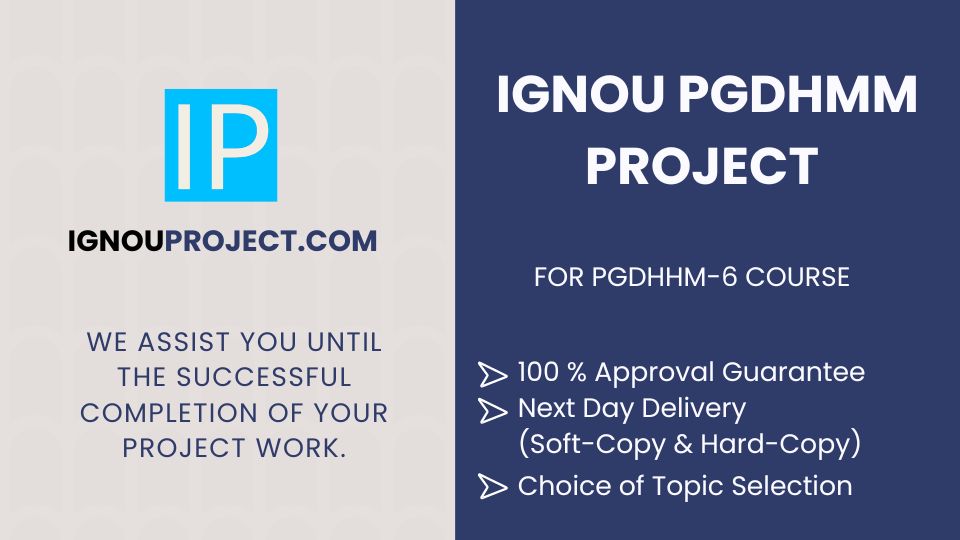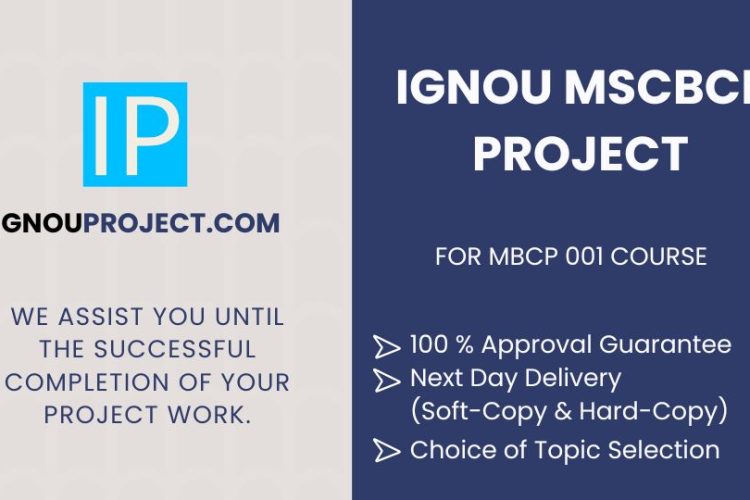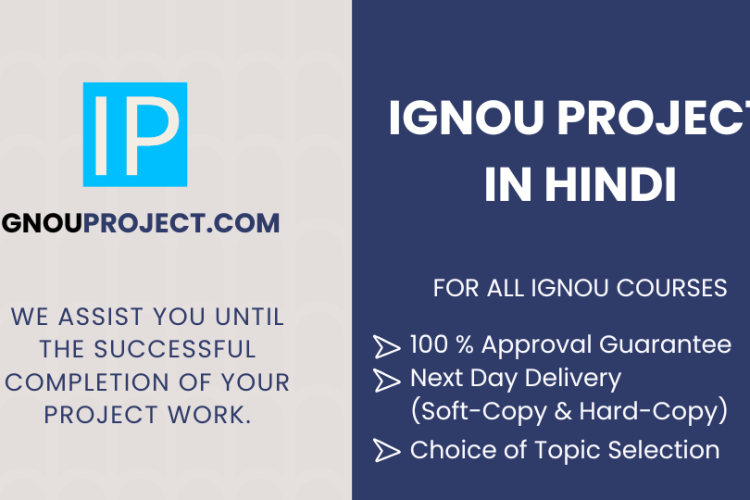
PGDHHM Programme is a 34 credit programme (18 credits of theory and 16 credits of practical) including project work. This IGNOU PGDHHM Project (PGDHHM-6) aims at improving the managerial skills of Hospital for the effective and efficient performance of the Hospitals. Medical/Dental Graduates, Graduates in Indian System of Medicine & Homeopathic, Graduates in Nursing, Graduates in Pharmacy, Graduates in Engineering or Architecture associated with Hospitals.
This IGNOU PGDHHM Project (PGDHHM-6) was launched in January 2001. Admission in the programme is offered only in January session. In view of the changing scenario requiring large number of trained administrators for hospital and health care organisation the PGDHHM programme aims at improving knowledge, skill and competence of students by imparting continued education through distance learning mode.
Whatsapp us to get the Personalized (Customized) IGNOU PGDHMM Project Report and Synopsis
Download Link for IGNOU PGDHMM Project (PGDHHM-6 PDF)
What are the key areas for selecting an IGNOU PGDHHM Project Topic?
- Healthcare quality management
- Hospital administration
- Patient safety and risk management
- Healthcare policy and planning
- Financial management in healthcare
- Public health initiatives
- Hospital information systems
- Human resource management in healthcare
What are the methods for data collection?
Data collection is a crucial phase in the IGNOU PGDHHM Project (PGDHHM-6), as it provides the necessary information to analyze and draw conclusions about your research problem. Here are the various methods you can use:
Surveys and Questionnaires
- Description: Structured forms with a set of questions designed to gather information from a large number of respondents.
- Application: Useful for collecting quantitative data on patient satisfaction, staff performance, healthcare service quality, etc.
- Tools: Online survey platforms (e.g., Google Forms, SurveyMonkey) or printed questionnaires.
Interviews
- Description: Direct, face-to-face or telephonic conversations with individuals to gather in-depth qualitative information.
- Application: Ideal for collecting detailed insights from healthcare professionals, patients, and administrators.
- Types: Structured, semi-structured, or unstructured interviews.
- Tools: Audio recording devices, transcription software.
Focus Groups
- Description: Group discussions moderated by the researcher to gather opinions and perceptions on a specific topic.
- Application: Effective for exploring collective views and generating new ideas on healthcare management practices.
- Tools: Recording equipment, discussion guides.
Observations
- Description: Systematic recording of observable behaviors and events in their natural setting.
- Application: Suitable for studying hospital workflows, patient interactions, and staff behavior.
- Types: Participant observation (researcher is part of the setting) and non-participant observation (researcher is an outsider).
- Tools: Observation checklists, field notes.
Document and Record Analysis
- Description: Examination of existing documents and records to extract relevant data.
- Application: Useful for analyzing hospital records, patient files, policy documents, and financial reports.
- Tools: Access to hospital databases, document review checklists.
Case Studies
- Description: In-depth analysis of a single case or a small number of cases.
- Application: Provides detailed insights into specific instances of healthcare management issues or practices.
- Tools: Case study protocols, data collection templates.
Secondary Data Collection
- Description: Use of existing data that has been collected by other researchers or organizations.
- Application: Useful for obtaining historical data, benchmarking, and comparative studies.
- Sources: Academic journals, government reports, healthcare databases, and published research papers.
Clinical Audits
- Description: Systematic review of clinical practices against predefined standards.
- Application: Used to evaluate the quality of care, adherence to guidelines, and identify areas for improvement.
- Tools: Audit tools, criteria checklists, and benchmarking data.
What is the format for the final IGNOU PGDHHM Project Report (PGDHHM-6)?
- Title page
- Certificate of originality
- Acknowledgements
- Abstract
- Table of contents
- List of tables and figures
- Chapters (Introduction, Literature Review, Methodology, Data Analysis, Findings, Conclusion, Recommendations)
- References
- Appendices
Can you use case studies in your IGNOU PGDHHM Project?
- Real-World Application: Case studies showcase how concepts and theories are applied in real healthcare settings. This adds a practical dimension to your project and demonstrates your understanding beyond textbook knowledge.
- Evidence and Support: By analyzing relevant case studies, you can gather evidence and data to support your arguments and proposed solutions.
- Learning from Others: Case studies often highlight successful initiatives or challenges faced by healthcare organizations. This allows you to learn from their experiences and adapt them to your project’s context.
Here are some pointers for using case studies effectively:
- Relevance: Ensure the case studies you choose are directly related to your project topic. They should provide insights applicable to the issue you’re addressing.
- Credibility: Source your case studies from reputable publications, peer-reviewed journals, or credible healthcare organizations.
- Critical Analysis: Don’t just present the case study; analyze it critically. Extract key learnings, identify strengths and weaknesses, and discuss their relevance to your project.
While case studies offer valuable insights, remember they shouldn’t be the sole focus of your project. Here’s how you can strike a balance:
- Use case studies to supplement your research and data collection.
- Integrate your analysis of case studies within your broader research framework.
- Build upon the learnings from case studies to propose your own solutions or recommendations.
What resources are available for IGNOU PGDHHM project work?
There are several resources available to you for IGNOU’s PGDHHM project, but it’s important to prioritize credible sources and avoid plagiarism. Here’s a breakdown of some helpful resources:
Official IGNOU Resources:
- Course Material (PGDHHM-001 to PGDHHM-006): These self-learning modules from IGNOU’s eGyanKosh portal cover the entire PGDHHM syllabus and often include project-related guidance.
- Program Guide: The IGNOU program guide for PGDHHM might outline project requirements, deadlines, and evaluation criteria.
- University Library: IGNOU likely has a library with a vast collection of books, journals, and online resources related to healthcare management. These can be a great starting point for your research.
Additional Credible Sources:
- Research Databases: Subscription-based databases like JSTOR or ScienceDirect offer access to scholarly articles, peer-reviewed journals, and healthcare research. You can check if IGNOU provides access to such platforms or explore options through your local library.
- Government Websites: Websites of healthcare ministries, regulatory bodies, and national health agencies often publish reports, data, and guidelines relevant to healthcare management.
- Reputable Healthcare Organizations: Websites of well-established healthcare organizations, hospitals, or industry associations might offer case studies, best practices, and reports on current healthcare issues.
What should be included in the introduction chapter of the project report?
- Overview of the topic
- Importance of the study
- Problem statement
- Objectives of the research
- Scope and limitations
What ethical considerations should you keep in mind for IGNOU PGDHHM Project?
Here are some ethical considerations to keep in mind while working on your IGNOU PGDHHM project:
Confidentiality:
- If your project involves patient data or healthcare information, ensure you maintain strict confidentiality.
- Anonymize any identifiable details and avoid disclosing sensitive information without proper authorization.
Informed Consent:
- In case your project requires interaction with healthcare professionals or patients, obtain their informed consent before collecting data or including them in your case study.
- Clearly explain the purpose of your project, how the data will be used, and how confidentiality will be maintained.
Data Integrity:
- Ensure the accuracy and authenticity of the data you use in your project.
- Be transparent about your data sources and methodologies.
- Avoid manipulating or fabricating data to fit your project’s narrative.
Objectivity:
- Strive for objectivity in your research and analysis.
- Present all sides of an issue fairly and avoid letting personal biases influence your conclusions.
Avoidance of Plagiarism:
- Properly cite all sources of information you use in your project.
- Give credit to the original authors of ideas and concepts.
- Don’t copy or paraphrase content from other sources without proper citation.
Respect for Intellectual Property:
- Obtain permission before using copyrighted materials like images, figures, or data sets in your project.
- There might be copyright-free resources available online or through IGNOU’s library.
Responsible Use of Case Studies:
- If you use case studies, ensure they are from credible sources and don’t violate patient privacy.
- Anonymize any sensitive details and obtain consent if the case study involves identifiable individuals.
Addressing Ethical Dilemmas:
- If you encounter ethical dilemmas during your project, consult your program advisor or a healthcare ethics committee for guidance.
- There might be specific ethical protocols or guidelines you need to follow depending on your project’s nature.
Can you collaborate with a hospital or healthcare organization for your IGNOU PGDHHM Project?
Collaborating with a hospital or healthcare organization for your IGNOU PGDHHM project can be beneficial but there are some factors to consider:
Feasibility:
- Hospital Research Approval: Hospitals often have strict procedures for research projects. You might need approval from their Institutional Review Board (IRB) which can be a lengthy process.
- Resource Availability: Hospitals might have limited resources to dedicate to student projects.
Potential Benefits:
- Access to Data: Collaboration can provide access to real-world data and insights from healthcare professionals.
- Practical Relevance: Your project can address a specific issue faced by the hospital, leading to practical solutions.
Alternative Approaches:
- Public Data: Many government agencies and healthcare organizations publish datasets related to healthcare management.
- Case Studies: Analyze existing case studies on hospital initiatives or challenges relevant to your project topic.
Initiating Collaboration:
- Identify Potential Partners: Look for hospitals or healthcare organizations aligned with your project’s focus area.
- Contact Research Departments: Hospitals often have dedicated research departments that handle research inquiries.
- Start Early: The approval process for hospital collaborations can take time, so begin early in your project timeline.
Here’s a recommendation:
Discuss with your Program Advisor: Explain your project idea and explore the feasibility of collaborating with a hospital. Your advisor can guide you on the process and potential challenges.
How can you improve the quality of your IGNOU PGDHHM Project Report?
Here are some ways you can improve the quality of your IGNOU PGDHHM project report:
Structure and Organization:
- Clear Structure: Follow a logical structure with well-defined sections like Introduction, Literature Review, Methodology, Findings, Discussion, Recommendations, and Conclusion.
- Logical Flow: Ensure a smooth flow of ideas between sections. Use transitions and headings to guide the reader.
- Conciseness: Be concise and avoid unnecessary information. Focus on the most relevant details and findings.
Content and Writing Style:
- Focus on the Problem: Clearly define the problem or issue you’re addressing in your project.
- Strong Research: Demonstrate strong research skills by including relevant literature, data, and evidence to support your arguments.
- Clear Writing: Use clear and concise language that is easy to understand for a healthcare audience.
- Formal Tone: Maintain a formal tone throughout the report, avoiding informal language or slang.
- Proper Grammar and Mechanics: Ensure proper grammar, punctuation, and spelling throughout the report.
Presentation and Formatting:
- Professional Formatting: Use professional formatting with consistent fonts, spacing, and margins as per IGNOU guidelines.
- Visual Aids: Incorporate visuals like tables, figures, or charts to effectively present data and complex information.
- Accurate Citations: Use proper citation styles (APA or MLA) to acknowledge all your sources and avoid plagiarism.
- Proofreading and Editing: Proofread your report carefully for any errors in grammar, spelling, or formatting. Have someone else review it for clarity and flow as well.
Read More:
Ready to get your IGNOU PGDHHM Project Report and Synopsis Sample PDF for PGDHHM-6?
- Visit: IGNOUPROJECT.COM
- Call us or WhatsApp us at: 9958947060, 9354637830
- Check Out: Projects

